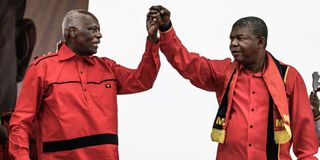Angolans mark 45-year journey as a free people

Retired Angolan President and then The People's Movement for the Liberation of Angola President Eduardo dos Santos and MPLA candidate to the presidency Joao Lourenço hold hands during the closing campaign rally in Luanda, on August 19, 2017.
What you need to know:
- The country entered a new phase in 2017, when President Jose Eduardo dos Santos left power after 38 years.
- On winning the elections, President João Lourenço identified the fight against corruption as his main governance banner.
Angolans are today celebrating 45 years of independence, earned in 1975 after 14 years of armed struggle for national liberation from 500 years of Portuguese colonisation.
Many fearless compatriots died for the national flag. But an internal armed conflict raged for 27 years.
The 1992 multiparty general elections would have an impact in 2002, with the signing of a lasting Peace and National Reconciliation Agreement. The government embarked on national reconstruction, reconciliation and consolidation of democracy.
The country entered a new phase in 2017, when President Jose Eduardo dos Santos left power after 38 years and was succeeded by President João Lourenço.
On winning the elections, President Lourenço identified the fight against corruption as his main governance banner and proceeded with reforms based on two fundamental pillars: Rule of law to win the trust of national and foreign investors; and consolidation of a free market economy.
Angola is an active member of regional and sub-regional organizations in Africa and international organisations focusing on promoting the culture of peace.
With the political support of Kenya, in August last year, Rwanda and Uganda signed the Luanda Memorandum of Understanding in in Luanda, Angola. Both in the African Great Lakes region, African Union (AU) and United Nations (UN), Angola has Kenya as an important strategic partner, hence its support for Kenya to the Non-Permanent Member of the United Nations Security Council (UNSC) seat for 2021-2022.
Diplomatic relations
Angola supports UNSC reforms to expand the number of permanent members, hoping Africa will secure two veto permanent seats and five non-permanent seats.
Angola is improving the business environment, reducing dependence on oil and attracting foreign investment in its diverse natural resources and other economic sectors.
Angola is open to Kenyans interested in agriculture and livestock, industry, fisheries, transport, education, tourism and others.
In July last year, Luanda hosted The Kenya-Angola Trade and Investment Conference, a major bilateral conference put together by diplomatic missions, business and corporate leaders from both countries. It is our wish to put the economic cooperation initiative into practice despite Covid-19.
But we need to take advantage of the good political and diplomatic relations between Angola and Kenya to promote closer ties at the citizen level using the economy and culture as factors of unity.
The famous South African song Jerusalema, which has become a worldwide phenomenon, has Angolan choreography.
The people of central and southern Angola have been dancing to Kenya’s Kamba benga music called Sungura. Kenyans have adopted and dance to Angolan kizomba and semba, which are already continental.
Let us capitalise on the strength of our cultures to bridge the gap between the two peoples.





